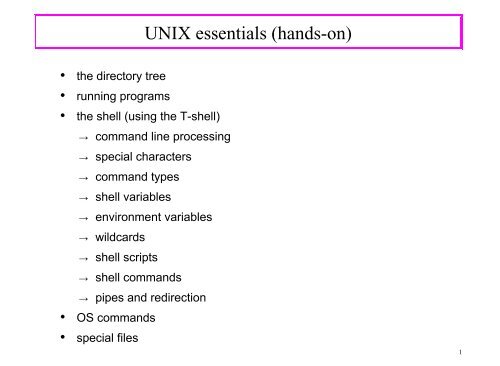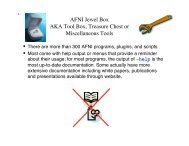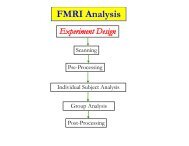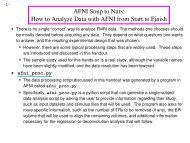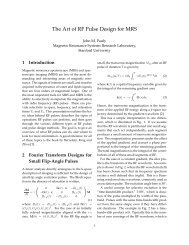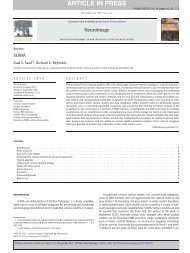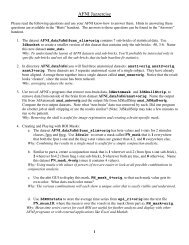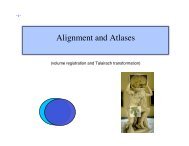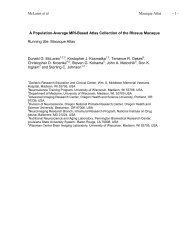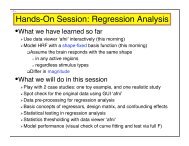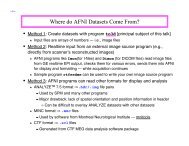UNIX essentials (hands-on)
UNIX essentials (hands-on)
UNIX essentials (hands-on)
You also want an ePaper? Increase the reach of your titles
YUMPU automatically turns print PDFs into web optimized ePapers that Google loves.
• The Shell→→→→command interpreter (case and syntax sensitive)examples: tcsh, csh, sh, bash, ksh, zsh, wish, tclsh, rsh, sshcommand: echo $SHELLthe T-shell: /bin/tcsh• an enhanced C-shell (csh), which has C programming style syntax• Command Line Processing (simplified outline):1) evaluate special characters, such as: ~ $ & * ? \ ' " ` |2) decide which program to execute• pathname, alias, shell command, search the $PATH3) execute appropriate program, passing to it the parameter list4) save the executi<strong>on</strong> status in the $status variable (0 is c<strong>on</strong>sidered success)→→command: ls $HOME ~/suma_demo '$pickle'tcsh has automatic filename completi<strong>on</strong> using the Tab key• type "ls suma" and hit the Tab key, watch what happens, and hit Enter• type "ls AF" and hit the Tab key, note what happens5
• Special Characters~ : the current user's home directory (e.g. /home/user), same as $HOME$ : used to access a variable (e.g. $home)& : used to put a command in the background (e.g. afni &)* : wildcard, matching zero or more characters (e.g. ls AFNI_d*)? : wildcard, matching exactly <strong>on</strong>e character (e.g. ls AFNI_data?)\ : command line c<strong>on</strong>tinuati<strong>on</strong> (must be the last character <strong>on</strong> the line)' : the shell will not evaluate special characters c<strong>on</strong>tained within these quotes(e.g. echo '$HOME' will output $HOME, not /home/user)(e.g. 3dbucket -prefix small_func 'func+orig[0,7..10,17]')" : the shell will evaluate $variables and `commands` c<strong>on</strong>tained within these(e.g. echo "[*] my home dir is $HOME")(e.g. echo "the numbers are 'count -digits 2 7 12'" )` : execute the command c<strong>on</strong>tained within these quotes, and replace the quotedpart with the output of the c<strong>on</strong>tained command(e.g. echo "the numbers are `count -digits 2 7 12`" )6
• Command Types→ the shell must decide what type of command it has:• pathname for a program: execute that program• alias: apply any alias(es) then start over (decide <strong>on</strong> which program to run)• shell command: part of the /bin/tcsh program• check the $PATH directories for the program→ c<strong>on</strong>sider the commands:/bin/ls AFNI_data1/afnils AFNI_data1/afnicd AFNI_data1/afniwc ~/AFNI_data1/afni/ideal_r1.1D→ the "which" command shows where the shell gets a command from:which ls which cd which wc• The PATH Variable→ a list of directories to be searched for a given program to be run from→ the $path and $PATH variables are identical, but are represented differently→ commands:echo $PATHecho $pathcat ~/.cshrc7
• Envir<strong>on</strong>ment Variables→ similar to shell variables, but their values will propagate to children shells→ by c<strong>on</strong>venti<strong>on</strong>, these variables are all upper-case (though it is not required)→ similarly, shell variables are generally all lower-case→ set envir<strong>on</strong>ment variables using "setenv" (as opposed to the "set" command)→ without any parameters, the "setenv" command will display all variables→ the "setenv" command will <strong>on</strong>ly set or assign <strong>on</strong>e variable at a time→ the format for the command to set a value is (without any '=' sign):setenv VARIABLE value• commands:setenv MY_NAME Elvisecho $MY_NAMEecho $pathecho $PATHecho $HOMEsetenv10
• Shell Scripts→→→→→→→a text file, a sequence of shell commandsthe '\' character can be used for line c<strong>on</strong>tinuati<strong>on</strong> (for readability)• for that purpose, it must be the last character <strong>on</strong> the line (including spaces)executing shell scripts, 3 methods:1) tcsh filename : execute filename as t-shell commands2) ./filename : execute filename according to the top "#!program"‣ if no such line, use the current shell‣ the file must have execute permissi<strong>on</strong>s (see 'ls -l')3) source filename : execute filename using current shell‣ this method affects the current envir<strong>on</strong>ment, so it should be used <strong>on</strong>ly whenthat is the intenti<strong>on</strong> (e.g. .cshrc)c<strong>on</strong>sider ~/AFNI_data1/ht03/c00.allc<strong>on</strong>sider ~/AFNI_data1/ht03/@stim_analyzeuse the command "nedit my.script" to create a script with a few commandsecho hi, I am in directory $cwdls -acd $HOME/AFNI_data1ls -alrun the script using the command: tcsh my.script12
• Some Shell Commands (handled by the shell)cdechopwdset@aliasbgfgexitsetenvsource: change working directory: echo command line to the terminal window: display the present working directory: set variables or assign string values to variables: set a variable to the results of an integral computati<strong>on</strong>: display or create an alias(e.g. alias hi 'echo hello there' ): put a process in the background (usually after ctrl-z): put a process in the foreground: terminate the shell: set envir<strong>on</strong>ment variables: execute a script within the current shell envir<strong>on</strong>ment• special keystrokes (to use while a process is running)ctrl-c : send an interrupt signal to the current processctrl-z: send a suspend signal to the current process13
• More Shell Commands: basic flow c<strong>on</strong>trol→ commands: if, else, endif, while, end, foreachif ( $user == "elvis" ) thenecho 'the king lives!'endifset value = 5set fact = 1while ( $value > 0 )@ fact = $fact * $value@ value -= 1endecho 5 factorial = $factforeach value ( 1 2 3 four eight 11 )echo the current value is $valueendforeach file ( I.*3 )ls -l $fileend14
• Pipes and Redirecti<strong>on</strong>> : redirect program output (stdout) to a filee.g. waver -help > waver.helpwaver -pickle > waver.help>& : redirect all output (both stdout and stderr) to a filee.g. waver -pickle >& waver.picklee.g. tcsh my.script >& script.output>> : append program output to a file| : pipe standard output to the input of another programe.g. 3dDec<strong>on</strong>volve -help | less|& : include stderr in the pipee.g. tcsh my.big.script• run the script• send all output to the tee program|& tee script.output• the tee program duplicates the input, sending the output to boththe terminal and the given file (script.output)• you can see the output, but it is also stored for future analysis15
• Some OS Commandsls : list the c<strong>on</strong>tents of a directory* cat : c<strong>on</strong>catenate files to the terminal (print them to the screen)* more : a file perusal program - view files <strong>on</strong>e page at a time* less : a better file perusal program (type less, get more)maninfo: <strong>on</strong>-line manuals for many OS commands (and library functi<strong>on</strong>s)- this uses a "less" interface to display the informati<strong>on</strong>- e.g. c<strong>on</strong>sider man <strong>on</strong> : ls, less, man, tcsh, afni: a new program to replace the "man" program* head : display the top lines of a file (default = 10)- e.g. 3dDec<strong>on</strong>volve -help | head -25* tail : display the bottom lines of a file (default = 10)- e.g. tail ideal_r1.1D* wc : word count - count characters, words and lines (of a file)cpmvrm: copy files and directories to a new locati<strong>on</strong>: rename a file, or move files and direcotories: BE CAREFUL - remove files and/or directories (no recovery)- e.g. rm junk.file- e.g. rm -r bad.directory* denotes a 'filter' program, which can take input from a file or from stdin16
* grep : print lines from a file that match the given patterne.g. grep path ~/.cshrce.g. ls ~/abin | grep -i vole.g. from the output of "3dVol2Surf -help" show lines whichc<strong>on</strong>tain 'surf', but not 'surface', then remove duplicates3dVol2Surf -help | grep surf | grep -v surface | sort | uniq• Some Special Files (in the home directory).cshrc : c-shell startup file ("csh run commands")‣ set aliases‣ adjust the path‣ set shell and envir<strong>on</strong>ment variables.afnirc : AFNI startup file.sumarc : suma startup file.login: commands run at the start of a login shell (e.g. a terminal window).logout : commands run before exiting a login shell.tcshrc : t-shell startup file (if it does not exist, the .cshrc file will be used)17


